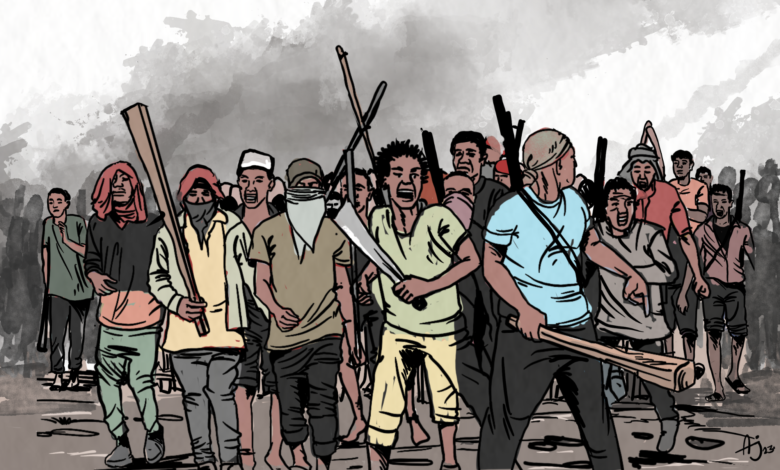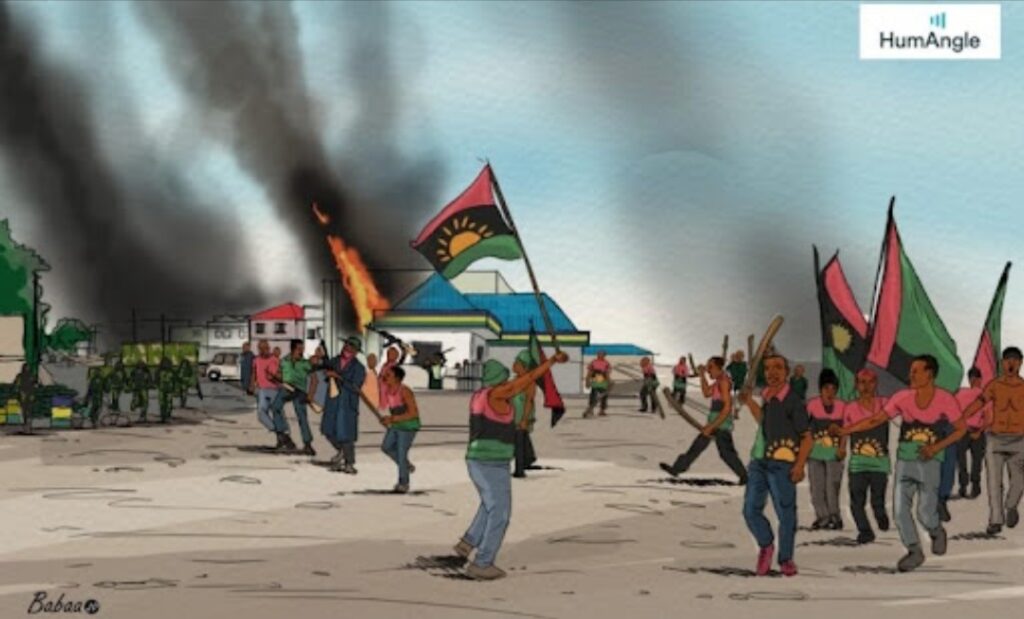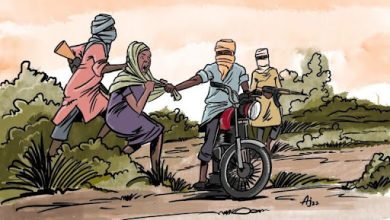A Threat In Every Region: The HumAngle Guide To Election Insecurity
Every region of the country is facing a specific kind of threat against the smooth running of the elections in which there are 93.4 million eligible voters.

This year, as 94 million Nigerians go to the polls, Nigeria is facing a specific security threat in every region of the country.
Violent riots due to the shortage of currency notes have erupted in parts of Nigeria’s southern region, highlighting the tense security situation that is unfolding as Africa’s largest democracy gets set for major elections in a few days time.
The recent move by the country’s central bank to redesign the currency and withdraw large volumes of cash from circulation has additionally rattled politicians and civilians alike and spilled over into violence.
On Monday, rioters in Sagamu, Ogun state, targeted at least four bank branches and the Ibadan Electric Distribution (IBEDC). The office of the Independent National Electoral Commission (INEC) in the Local Government Secretariat was affected too.
Several other states have witnessed varying degrees of protest, including Edo, Delta, Oyo, and Ondo in the south and Benue and Kwara in the central region.
These riots have amplified the security troubles facing the upcoming election, the shape of which varies from region to region.
The threats extend to online disinformation and its effect on public safety during and after the process.
Separatist and militant groups
Separatist and militant groups constitute the most significant threats to the election in southern Nigeria. However, neighbourhood and organised gangs are also active sources of violence used to suppress opponents and voters.
In the southeast, terrorists affiliated with the Indigenous People of Biafra (IPOB), agitating for an independent state, have attacked multiple facilities belonging to the electoral commission.
It’s part of a larger conflict involving militants targeting government institutions and security forces with small arms fire and explosive devices.
The opposition to the Nigerian government has included attacks aimed at disrupting INEC’s capacity. For example, on Thursday, Feb. 16, militants attacked Ukpor High School, the venue of the Electoral Commission’s training programme in the Nnewi South area of Anambra.
“I doubt if those people will still agree to work for INEC in that area. But we thank God that no one was killed in the process. The incident left me traumatised. We are not sure these people will allow us to work next week,” a source told Daily Trust.
The use of intimidation and the violent enforcement of the sit-at-home order have been used as tools against the civilian population and their ability to participate in the polls.
The impact was evident in the low turnout in the 2021 Anambra governorship election. The group’s actions have similarly affected voter registration and the collection of permanent voter’s cards in the region.

In the south-south, the activities of militants and criminal groups are a prevalent security threat.
This risk will spill over into the election, creating a tense environment, especially in hotspots around the swamps.
In January, Vanguard reported that a group in the creeks of the Niger Delta, known as The Force of Egbesu, had issued a warning to President Muhammadu Buhari and state governors, asking them to do the needful for the region or they would unleash ‘hell’ during the elections.
In 2019, the electoral commission in Akwa Ibom state reported that polls could not take place in Udung Uko Local Government Area because of militant attacks.
The security situation is already a concern heading to the polls. The Peoples Democratic Party (PDP) Presidential Campaign Council in Rivers state announced a rally cancellation due to what was described as incessant attacks on its members.
In the southwestern part of the country, there will be risks caused by thugs and organised armed gangs.
For instance, supporters of the Labour Party candidate were attacked on their way to a rally at the Tafawa Balewa Square in Lagos.
Separatist agitations in the region will also be an issue for security forces. In November, two INEC offices were set ablaze in Ogun and Osun by suspected Yoruba nationalists.
Thousands of materials were destroyed in the raid, including ballot boxes, voting cubicles, election bags, electric power generators, and uncollected Permanent Voters Cards.
Terror groups and election security
The insecurity in the northeast, north-central and northwest regions poses a challenge to the movement of electoral materials across specific routes and the conduct of elections in several remote communities. Similarly, the displacement of millions of people will deny them access to their polling units.
Insurgent groups could hinder the conduct of polls in areas where they have influence. It is possible they will also cause disruption and panic in areas outside their domains.
The Islamic State West African Province (ISWAP), on Tuesday, Feb. 22, released a video aimed at the election and highlighting their objection to the democratic process.
In 2019, the group fired rockets into Maiduguri, the Borno state capital, just hours before voting began for the presidential election.
What’s different this time is the group’s expansion into new frontiers beyond the traditional enclave in the northeast and Lake Chad Basin, where the insurgency by Boko Haram and ISWAP displaced over two million people.
The Islamic State cells have carried out assaults and used explosive devices in the north-central states of Kogi, Niger, and Nigeria’s capital of Abuja.
The group has also carried out terror attacks in Ondo in the southwest, Edo in the south-south, and Taraba in the northeast.
This shift in operation means new threats and restrictions, especially for foreign observers.
The Al Qaeda-affiliated Jama’atu Ansaril Muslimina fi Biladis Sudan (Ansaru) is also a problem.
Since returning to operational status, Ansaru has contributed to the insecurity in the northwest and north-central regions. They have preached against people participating in the political process in places where they have a strong presence.
Although the group has a limited reach, it still presents a risk in volatile communities such as the Birnin Gwari area of Kaduna state.
“We don’t know how the coming elections will take place in those areas because of the presence of Ansaru. Even during the last local government election, elections did not hold in these areas due to the escalating insecurity,” Birnin-Gwari Emirate Progressives’ Union (BEPU) was quoted to have said last year.
Ansaru is part of a broader web of insecurity in these regions, which includes violence by ethnic militias and criminal groups that has forced over a million people to flee their homes. The displacement and activities of these armed groups will affect the conduct of elections or the movement of materials, particularly along highways, due to the risk of interception and abduction.
This will also be a concern in parts of Zamfara state, the epicentre of the violence by armed groups notorious for moving around in motorcycles to raid communities and kidnap people for ransom.
Some of the flashpoints would be located in some of the local government areas bordering Sokoto, Kaduna and Niger.
For instance, in Zamfara parts of Maru, Tsafe, Anka, Maradun, Gusau, Bukkuyum, Shinkafi will be trouble areas, while in Sokoto the volatile areas will be in Illela, Rabah, Sabon-Birni, Isa, Gada and Goronyo, Tangaza, Gudu and Kebbe.
The threats in the north would not be isolated to the armed groups; they would involve thugs armed with sticks and knives employed to interfere through violence.
Responding to the threats
Authorities are aware of the threats and have tried to assure the citizens of protection. They have assembled resources and rolled out interventions, including coordination of security forces at the Inter-Agency Consultative Committee on Election Security (ICCES) level.
During the ICCES meeting on Tuesday in Abuja, representative of the National Security Adviser (NSA) Babagana Monguno warned against plots to exploit the current socio-economy situation in Nigeria to ignite civil unrest before, during, and after the general elections.
Earlier in the month, the NSA had assured Nigerians that the elections would be conducted in an atmosphere devoid of hostility.
He was reported to have said that “the 2023 elections will go on in a climate devoid and bereft of rancour. The security agencies have done a lot in the last couple of months to put things in place”.
The police, the primary security system for the elections, has said that hundreds of thousands of officers will be deployed. According to the Inspector-General, Usman Alkali Baba, the police will deploy 310,973 personnel, comprising regular police officers, the paramilitary unit, the counterterrorism unit and special forces, and the intelligence response team.
Other security agencies, including the military and the Department of State Service (DSS), would complement with an estimated 93,133 personnel. The country’s top military chief, Gen. Lucky Irabor, has also assured that the armed forces and other security forces were ready to provide a safe and secure environment for the elections.
Although the significant deployment of law enforcement and military personnel will provide favourable conditions for the elections in many locations, it would likely not be sufficient to provide guarantees in several hotspots due to the intensity and scale of the crises.
Support Our Journalism
There are millions of ordinary people affected by conflict in Africa whose stories are missing in the mainstream media. HumAngle is determined to tell those challenging and under-reported stories, hoping that the people impacted by these conflicts will find the safety and security they deserve.
To ensure that we continue to provide public service coverage, we have a small favour to ask you. We want you to be part of our journalistic endeavour by contributing a token to us.
Your donation will further promote a robust, free, and independent media.
Donate HereStay Closer To The Stories That Matter




